John Carlin
Los catalanes ya han llegado a su límite de aguante tras tres siglos de agravios, pero la intransigencia del gobierno español es, en última instancia, la culpable de la crisis actual.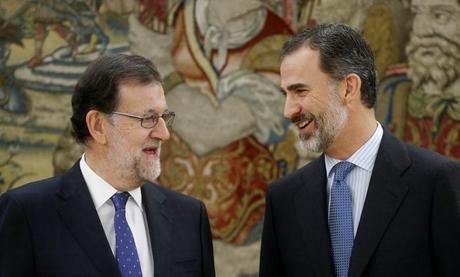
Poco antes de que el rey de España se dirigiera a la nación esta semana, algunos de sus súbditos más racionales esperaban que, tal vez, pudiera elevarse por encima de la mezquindad de la clase política de Madrid. Pensaban que podía ofrecer una visión generosa de cómo resolver la crisis causada ante el creciente clamor por la independencia catalana. No hubo suerte. Al final de su discurso de seis minutos, Felipe VI sólo había empeorado las cosas.
Rígido en su porte, con frialdad en su tono, no construyó puentes, cavó trincheras. No lamentó la violencia policial durante la celebración del pasado domingo de un referéndum en Cataluña, tan perjudicial también para la imagen exterior de su país; denunció la "irresponsabilidad" y el "desprecio" del gobierno catalán elegido por los catalanes y amenazó con más violencia. La "responsabilidad de los poderes legítimos del Estado", advirtió el rey, es la de "garantizar el orden constitucional", forma codificada de decir que si el gobierno catalán cumple su promesa de declarar la independencia unilateral, se enviarán los tanques.
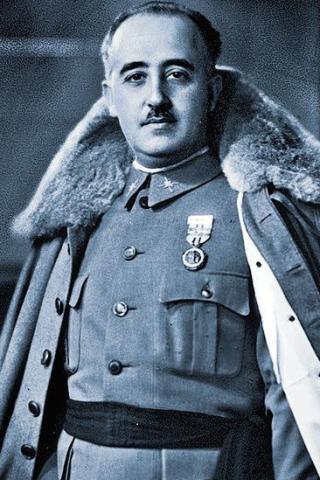
Hablando en nombre no de la nación, sino del gobierno central, se limitó a imitar cómo el ministro Mariano Rajoy ha actuado durante estos últimos cinco años: abdicó de su responsabilidad y, ajeno a lo que estaba haciendo, abdicó también como soberano en los corazones de los cada vez más amargados 7.5 millones de catalanes, el 80% de las cuales están a favor del derecho al voto sobre la independencia.
Antes del domingo, varias encuestas indicaban que el voto secesionista en Cataluña se situaba entre el 40 y el 50 por ciento. No cabe duda de que esos números han aumentado desde entonces. Como dijo un amigo británico que conoce bien la política española, minutos después del discurso del rey, "aumentó en otros diez puntos el número de los independentistas ". Así es, agregándose. a los diez o más que se habían sumado después de los apaleamientos de la policía del domingo pasado.
Tengo un interés más que académico en este despliegue lento hacia el desastre. Mi madre es española, de Madrid. Viví 15 años en Cataluña hasta que me mudé a Londres, hace cuatro años, pero siempre he querido regresar y solicitar un pasaporte español después del referéndum sobre el Brexit. Me encanta España, así que estoy contra la independencia catalana, pero nunca he amado la política española, especialmente la peligrosa cepa autoritaria representada por la gente en el poder hoy y compartida por gran parte de la clase política madrileña. Nunca he olvidado una conversación que tuve hace 15 años con un hombre que sigue siendo un pilar de ese régimen. "No soporto a los catalanes", exclamó. "Siempre quieren hacer un trato. ¡No tienen principios, por Dios! ¡No hay principios!"
Es el aferramiento de Madrid a sus sagrados principios lo que nos ha llevado al peligroso desorden de hoy. También explica lo que, para la mente anglosajona, parece ser la inexplicable negativa del gobierno de Rajoy a tratar de resolver el problema a través de la mediación internacional o el diálogo de cualquier tipo. "Principios" en el contexto catalán significa la Constitución española, que no permite un referéndum sobre la soberanía de Cataluña. Uno podría pensar que una Constitución, siendo un documento humano, necesariamente falible, estaría abierta al cambio a medida que las circunstancias cambiasen. No en la cuestión catalana; no para Rajoy.
Miguel de Unamuno, célebre escritor español del siglo pasado, lamentó lo que veía como un espíritu político nacional contaminado "por los cuarteles y la sacristía". Mi opinión ha sido desde hace mucho tiempo que el hábito de pensamiento intransigente exhibido por la clase política de España es la herencia de 500 años de absolutismo católico. El catolicismo español era, para la cristiandad en general, lo que el Islam saudí es para el mundo musulmán de hoy: el más resistente a la influencia filosófica, política, cultural o científica exteriores. No creo que sea un accidente que no haya traducción en español, o en árabe, de la palabra inglesa "compromise". El concepto de "cedo un poco y tú cedes un poco para que ambos acabemos ganando" es ajeno a la mente política española.
Es por eso que el imperio español perdió Cuba en 1898, y antes California y el resto de lo que ahora es el oeste de los Estados Unidos. Es la razón principal por la que, sobre la cuestión catalana, el gobierno de centro-derecha del Partido Popular de Rajoy y la clase política madrileña han logrado lo contrario de lo que pretenden: en lugar de trabajar para preservar la unidad de España, alientan al pueblo catalán y echan combustible al camino hacia la independencia.
En pocas palabras, son políticos de tercera categoría. La primera regla para la resolución inteligente de una disputa como la del problema catalán es conocer a tu enemigo: ponerse en sus zapatos, tratar de entender por qué piensan de la manera que lo hacen y, luego, tratar de persuadirlos de que se acerquen a tu punto de vista, o al menos para encontrarte en medio del camino. En La lucha por Cataluña, un nuevo libro del corresponsal del New York Times en España, Raphael Minder, acaba con la siguiente nota: los pueblos de España no se unirán, escribe Minder, mientras la clase política de Madrid no haga ningún esfuerzo por "comprender los sentimientos expresados por cientos de miles de personas en las calles de Barcelona".
Los sentimientos nacionalistas catalanes se remontan al menos a 300 años atrás. El 11 de septiembre de 1714, al final de la guerra de sucesión española, Barcelona cayó tras un largo asedio ante el ejército de Felipe V, el primer rey Borbón de España. Su homónimo actual podría haber tenido un poco más de tacto en su discurso esta semana, y hubiera podido recordar que esta gloriosa derrota, el Dunkerque catalán, marca hoy la fecha de la fiesta nacional anual de Cataluña. Se trata de una conmemoración del heroísmo suicida de los defensores de la ciudad, pero también un recordatorio de la opresión que sufrieron bajo Felipe V, un gobernante absoluto que demolió una quinta parte de la ciudad, cerró el parlamento catalán y las universidades y prohibió al catalán en la administración.
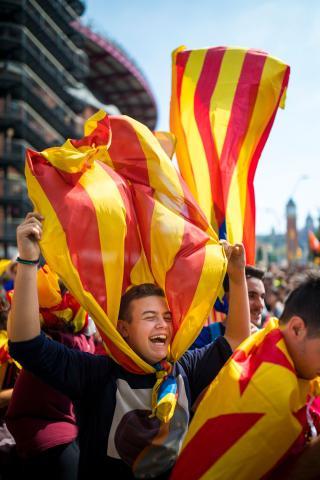
Otro gobernante absoluto de memoria más reciente, Francisco Franco, avivó las llamas del agravio nacionalista llevando a cabo medidas asombrosamente similares después de que asumiera el poder por la fuerza en 1939, después de la victoria de sus fuerzas fascistas en la guerra civil española. Además de las ejecuciones por fusilamiento de los principales políticos catalanes y de otros tantos miles de personas, también suprimió el lenguaje local, principal emblema de la identidad catalana. Bajo el gobierno de Franco, los padres no podían dar a sus hijos nombres catalanes como Jordi o Josep. El generalísimo optó por considerar al catalán como un dialecto, algo tan insultante como erróneo: el catalán es un idioma, tanto como el español, el francés y el italiano.
Una herencia de la era franquista que sigue agitando la olla nacionalista es el desdén por el catalán entre otros españoles. Se acompaña de una aversión por los catalanes en general, que muchos optan por considerar como estirados y creídos, cuando la verdad es, creo, que son simplemente tímidos. Pero el nacionalismo es un sentimiento, un resentimiento a fuego lento hacia un vecino percibido como abusador. El nacionalismo no es un plan. La independencia sí lo es. Lo que vemos hoy es cómo uno ha evolucionado hacia el otro y en una escala nunca antes vista. Muchos de los que en otro tiempo eran simplemente nacionalistas de corazón, plenos de sentimientos, son ahora militantes activos por la independencia.
Los años 2006, 2010 y 2012 marcan la progresión. En 2006, el voto pro-independencia representaba apenas el 15% de la población. Una decisión tomada ese año dio esperanzas de que la cifra se redujera: no sólo el Parlamento catalán de Barcelona, sino el parlamento nacional de Madrid, votaron a favor de un nuevo estatuto que definía a Cataluña como nación y le otorgaba mayor autonomía de la que había disfrutado desde la muerte de Franco en 1975. Esto incluía el dotar a Cataluña de un mayor grado de independencia judicial.
Los retrasos en la aplicación del estatuto dieron tiempo para una reacción nacionalista española. En 2010, el Partido Popular de Rajoy, entonces en oposición, sucumbió a la tentación que provocó la explosión del independentismo catalán y que ha llevado a la crisis actual: buscar votos en el resto de España, haciendo campaña contra el estatuto catalán, llevándolo al notoriamente politizado Tribunal Constitucional, donde fue anulado. La ley derrotó a la política, lo que fue el precedente que sigue obstaculizando una solución del problema hoy.
En 2012, lo que entonces era el gobierno de centro-derecha catalán, sin embargo trató de encontrar un acercamiento a Rajoy, que se había convertido en primer ministro el año anterior. Buscó la negociación para tratar de obtener concesiones fiscales en la línea de las concedidas al País Vasco, cuyo gobierno tiene una autoridad mucho mayor sobre la recaudación y distribución del dinero de los impuestos. Pero Rajoy los rechazó. Si se suma la crisis económica y el alto desempleo a la indignación de los catalanes comunes por el trato despectivos que sentían que habían recibido, el resultado fue la mayor protesta que nadie en Cataluña podría recordar. En la fiesta nacional del 11 de septiembre, un millón de personas salieron a las calles de Barcelona.
Lo que pidieron fue entonces un referéndum de independencia legalmente vinculante, y la esperanza creció después de que el gobierno británico accediera precisamente a tal cosa en Escocia, en 2014. Pero el gobierno de Rajoy no se movió. La ley era la ley. El pragmatismo era para él una palabra griega ininteligible. Era como si se apropiara del consejo que Franco le había dado una vez al editor de un periódico afín: "Haz como yo, no te involucres en política".
Pero los catalanes estaban, al contrario, haciendo mucha política, y en 2015 una coalición pro-independencia, encabezada por Carles Puigdemont, llegó al poder por un delgado margen en el parlamento catalán. Con lo cual la retórica de ambos lados se puso más enconada, y el clima político más hostil.
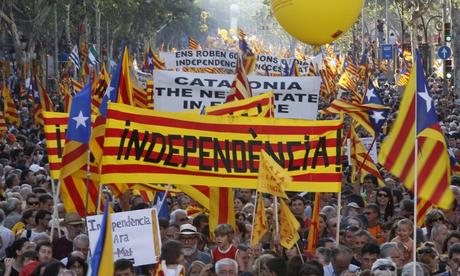
El gobierno de Rajoy y sus partidarios en los medios de comunicación han retratado al "pelo de fregona" Puigdemont y a sus camaradas radicales como irresponsables e infantiles, pero ha sido difícil evitar la conclusión de que, de ser así, los políticos supuestamente adultos en Madrid han descendido al mismo nivel. El ministro de Educación echó más leña al fuego indicando su intención del gobierno de "españolizar" a los niños catalanes; el ministro de Relaciones Exteriores hizo lo mismo cuando acusó al gobierno catalán de "levantamiento" y "golpe de Estado". Felipe González, ex primer ministro socialista, los superó a ambos en un artículo en El País en el que comparó el movimiento de independencia con "la aventura alemana o italiana" de los años treinta.
Las cosas podrían haber sido muy diferentes, tan fáciles, empezando por que el Partido Popular hubiera reprimido el impulso vengativo que lo llevó a anular el estatuto de autonomía a través de los tribunales. Incluso si no hubiera sido así, las protestas callejeras masivas dos años más tarde dieron otra oportunidad. Si Rajoy tuviera un algo de estadista, podría haber ido a Barcelona, discutido conciliadoramente y ofrecido diálogo al gobierno catalán, menos militante y más flexible, que entonces estaba en el poder. Los aplausos habrían resonado alrededor del pasillo y los radicales de Puigdemont probablemente habrían también aplaudido.
El peligroso enfrentamiento actual entre los fanáticos españoles y los románticos catalanes nunca habría ocurrido si, junto con el cambio en el fondo de la actitud, el resultado de las conversaciones hubiera sido la concesión de un referéndum vinculante como el que Escocia realizara hace tres años. Los catalanes dicen de sí mismos que dos emociones compiten en sus corazones, seny y rauxa : el sentido común y la pasión furiosa. Son, por tradición. mediterránea una antigua nación que negocia. Cuando no están enojados, como ahora, son las personas más prácticas de la tierra. Un referéndum celebrado hace un par de años habría producido con toda probabilidad un "no" sustancial a la independencia de España y, como sucedió en Quebec, el tema habría sido puesto a enfriar por lo menos durante una generación.
En cambio, lo que tenemos ahora es el absurdo cruel del gobierno de Madrid actuando hacia los catalanes como un marido que odia a su esposa y la maltrata, negándose a contemplar como ella le abandona, gritando "¡Ella es mía!".
¿Que pasa ahora? Puigdemont ha dicho que hará una declaración unilateral de independencia, pero su demora en hacerlo indica un miedo completamente realista a las represalias más violentas de Madrid, de ahí su deseo declarado de mediación a la UE, hasta ahora rechazado. Tal declaración no significaría más que el resultado del "referéndum" unilateral: sería más bien teatro político. Cataluña no es una pequeña isla del Pacífico, suficiente por sí misma. Forma parte de España y forma parte de la Unión Europea. Un Catexit duro, en una noche, simplemente no es posible. Puigdemont está jugando un juego de alto riesgo.
El gobierno español podría ver, sin embargo, que está jugando un juego, si lo deseara, y reaccionar proporcionalmente: vigilar y esperar un poco, reconocer que el clamor por la independencia catalana tiene un apoyo significativo detrás de él, y acceder a las conversaciones. La "esposa", en este escenario, podría aceptar aún a algunas proposiciones. Rajoy podría hacer lo que debería haber hecho hace cinco años y aceptar un referéndum vinculante. En el caso de una victoria para el voto "sí", el orden - al menos el orden del tipo que ahora se encuentra en el Brexit de Gran Bretaña - sería restaurado. Madrid, habiendo dado su bendición legal al referéndum, tendría que soportar con los dientes apretados el resultado. En el caso de una victoria del "no", el problema estaría resuelto.
Sin embargo, ni hablar de eso. Tal y como están las cosas, lo más probable es que triunfe la inquietante defensa del "orden constitucional" por "las fuerzas estatales legítimas". Luis de Guindos, ministro de Economía, mostró lo inflexible que es el gobierno español cuando dijo en una entrevista televisiva, el jueves pasado, que la independencia catalana estaba "fuera de consideración" porque era, en primer lugar, "ilegal" y, segundo, "irracional ":" Cataluña siempre ha sido parte de España ".
Una parte de mí todavía se aferra a la mota de esperanza que sentí antes del discurso del rey, que tal vez la UE vaya a intervenir y hacer entrar en razón a los líderes españoles. Pero es más probable que lo hagan sólo después de que muelan a palos a más catalanes, momento en el que puede ser demasiado tarde. Una muerte a manos de la policía del rey, un mártir por la causa catalana, y cualquier cosa podría suceder. Rajoy llama a Puigdemont traidor, pero si el conflicto se inclina hacia la violencia generalizada, y si Catalunya finalmente consigue la independencia, la historia puede registrar que el traidor más grande fue Rajoy.
Catalan independence: arrogance of Madrid explains this chaos
Three centuries of Catalan grievances came to a head this week, but the intransigence of Spain’s government is ultimately to blame for the crisis
October 7 2017, 12:01am, The Times
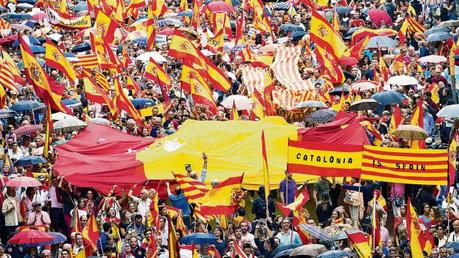
Opponents of Catalonia’s independence referendum displayed their allegiance to Spain in Barcelona last Sunday TIMES PHOTOGRAPHER JAMES GLOSSOP
Shortly before the King of Spain addressed the nation this week, some of his more rational-minded subjects hoped that maybe, just maybe, he might rise above the petty-mindedness of the Madrid political establishment. He could, they thought, offer a generous vision of how to resolve the crisis caused by the escalating clamour for Catalan independence. No such luck. By the end of his six-minute speech Felipe VI had only made things worse.
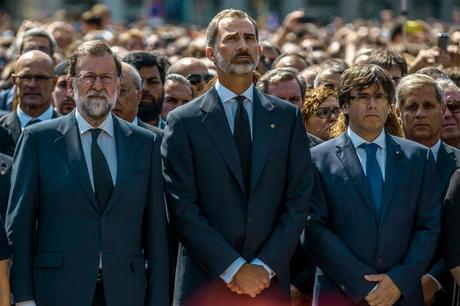
Spanish prime minister Mariano Rajoy, King Felipe VI and Catalan president Carles Puigdemont in a rare moment of unity, observing a minute’s silence for victims of the August terrorist attacks MATTHIAS OESTERLE/ALAMY
Put simply, they are third-rate politicians. Rule one for the intelligent resolution of a dispute like the Catalan one is to know your enemy: put yourself in their shoes, try to understand why they think the way they do and then try to persuade them to come around to your point of view, or at least to meet you halfway. The Struggle for Catalonia, a new book by the New York Times correspondent in Spain, Raphael Minder, ends on just this note. The peoples of Spain will not be reunited, Minder writes, so long as the political establishment in Madrid makes no effort to “understand the feelings expressed by hundreds of thousands on the streets of Barcelona”.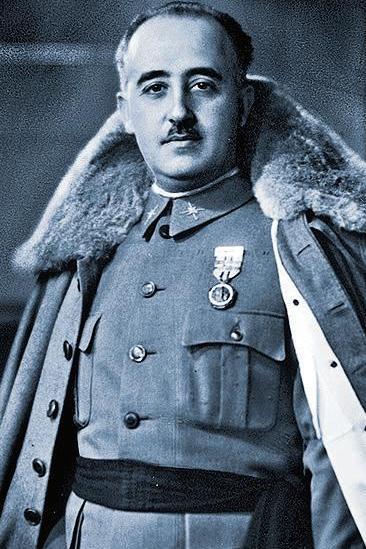
The suppression of Catalan culture after 1939 under General Franco, which included banning Catalan Christian names, finds an echo today in the disdain of many Spaniards for the region and its people KEYSTONE/GETTY IMAGES
A hangover of the Franco era that continues to stir the nationalist pot is the disdain for Catalan among other Spaniards. It is accompanied by a dislike for Catalans generally, whom many choose to regard as snooty and superior when the truth is, I think, that they are merely shy. But nationalism is a sentiment, a simmering resentment towards a neighbour perceived to be abusive. Nationalism is not a plan. Independence is. What we see today is how one has evolved into the other and on a scale never before seen. Many who were once merely heart-sore nationalists are now active campaigners for independence.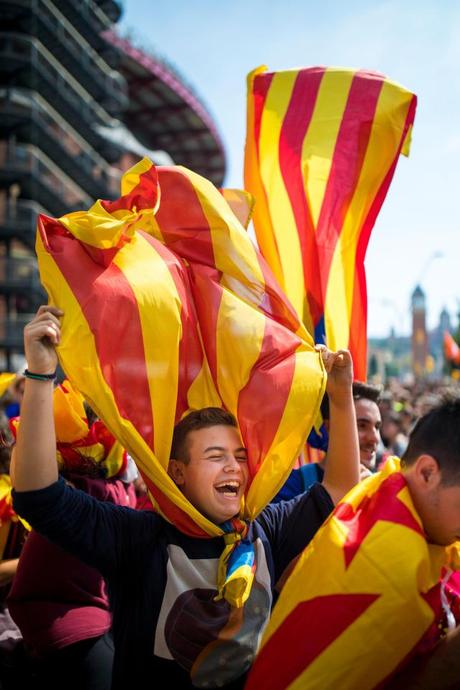
Protesters took to the streets of Barcelona after Madrid blocked the Catalan government’s referendum on independence TIMES PHOTOGRAPHER JAMES GLOSSOP
What they called for was a legally binding independence referendum and the clamour only grew after the British government agreed to precisely such a vote in Scotland in 2014. But Rajoy’s government would not budge. The law was the law. Pragmatism was for him an unintelligible Greek word. It was as if he took his cue from the advice Franco once gave a friendly newspaper editor: “Do as I do, don’t get involved in politics.”
